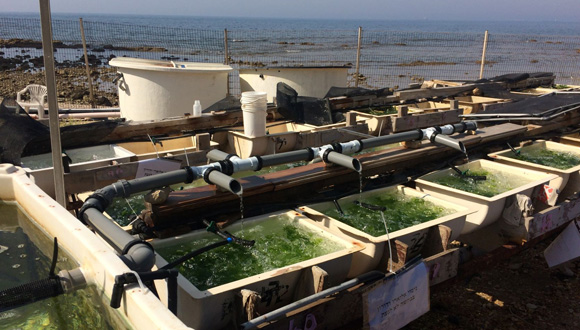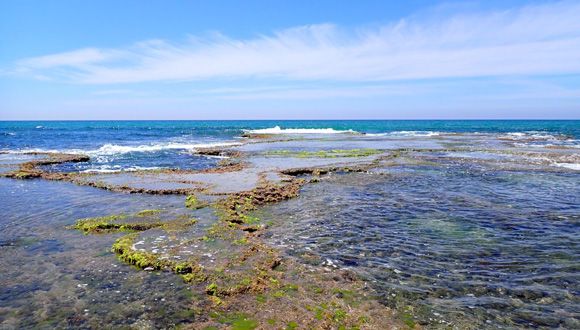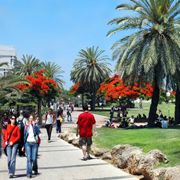Like Manna from the Sea
Innovative technology may ease global food crisis: “enriched seaweed” with extremely high nutritional value
Innovative technology may ease global food crisis: “enriched seaweed” with extremely high nutritional value
Researchers from Tel Aviv University and the Israel Oceanographic and Limnological Research Institute in Haifa have developed an innovative technology that enables the growth of “enriched seaweed” infused with nutrients, proteins, dietary fiber, and minerals for human and animal needs.
According to the researchers, the state-of-the-art technology significantly increases the growth rate, protein levels, healthy carbohydrates, and minerals in the seaweed’s tissues – making the “enriched seaweed” a natural superfood with extremely high nutritional value, which can be used in the future for the health food industry and to secure an unlimited food source.
The research was led by Ph.D. student Doron Ashkenazi, under the guidance of Prof. Avigdor Abelson from the School of Zoology, George S. Wise Faculty of Life Sciences at Tel Aviv University and Prof. Alvaro Israel of the Israel Oceanographic and Limnological Research Institute (IOLR) in Tel Shikmona, Haifa. The article was published in the scientific journal Innovative Food Science & Emerging Technologies.
"Seaweed can be regarded as a natural superfood, more abundant in the necessary components of the human diet than other food sources."
A Natural Superfood
Doron Ashkenazi explains that in the study, local species of the algae Ulva, Gracilaria and Hypnea were grown near fish farming systems under different environmental conditions. The special conditions allowed the seaweed to flourish and enabled a significant improvement in their nutritional value to the point of their becoming “enriched seaweed,” a superfood.
“Seaweed can be regarded as a natural superfood, more abundant in the necessary components of the human diet than other food sources,” Ashkenazi adds. “Through the technological approach we developed, a farm owner or entrepreneur will be able to plan in advance a production line of seaweed rich in the substances in which they are interested, which can be used as health foods or nutritional supplements; for example, seaweed with a particularly high level of protein, seaweed rich in minerals such as iron, iodine, calcium, magnesium, and zinc, or in special pigments or anti-oxidants. The enriched seaweed can be used to help populations suffering from malnutrition and nutritional deficiencies, for example disadvantaged populations around the world, as well as supplements to a vegetarian or vegan diet.”
In fact, the use of seaweed as a rich food source that meets all human nutritional needs is reminiscent of the biblical manna that fed the Israelites in the desert.

Layout of the land-based, outdoor, aquaculture system as was stationed at the IOLR institute, Haifa, Israel
“Technologies of this type are undoubtedly a model for a better future for humanity, a future where humans live in idyll and in health in their environment.”
Aquaculture, Tomorrow's Agriculture
Unlike terrestrial agriculture, aquaculture, and in particular the proposed seaweed farming approach, does not require extensive land, fresh water, or large amounts of fertilizer. Environmentally friendly, it preserves nature and the ecological balance by reducing environmental risks. The new methodology, in fact, offers an ideal situation, of sustainable and clean agriculture.
Today, integrated aquaculture is beginning to receive support from governments around the world due to its environmental benefits, which include the reduction of nutrient loads to coastal waters and of the emission of gases and carbon footprints. In this way, it contributes to combatting the climate crisis and global warming.
“Technologies of this type are undoubtedly a model for a better future for humanity, a future where humans live in idyll and in health in their environment,” concludes Ashkenazi.
The research was conducted in collaboration with other leading researchers from around the country, including Guy Paz and Dr. Yael Segal of the Israel Oceanographic and Limnological Research Institute (IOLR) in Haifa, Dr. Shoshana Ben-Valid, an expert in organic chemistry, Dr. Merav Nadav Tsubery of the Department of Chemistry in the Faculty of Exact Sciences at Bar-Ilan University, and Dr. Eitan Salomon from the National Center for Mariculture in Eilat.






